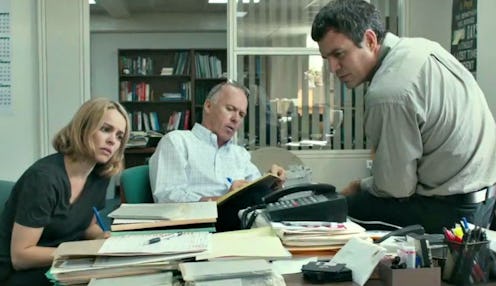
The media these days, am I right? Whether you're a New York Times devotee or a CNN-only kind of girl, it seems that everyone has a love/hate relationship with the news and how they get it. It's more than just the channel; people have favorite writers, beloved TV pundits, and trusted outlets. Yet when it comes to how journalism is represented in film, not everything is so clear. While the news is, of course, bound to tell the truth, recent movies revolving around journalism like Spotlight and Truth have shed light on the oft-complicated ways members of the media are portrayed, the validity of their stories, and the methods in which they obtain their info. Hollywood has always tended to make the truth more exciting, but it’s curious how certain films choose to represent the journalists involved.
In some circumstances, filmmakers seem like they want journalists to be heroes. We, the press, are supposed to uncover the truth, expose scandals, and bring important, potentially life-saving information to the masses. Take Thomas McCarthy’s Spotlight, starring Michael Keaton, Rachel McAdams, and Mark Ruffalo, which details the story behind the Boston Globe's 2002 Pulitzer-winning investigation of the Catholic Church sex abuse scandal. Much like those in 1976's All the President’s Men, to which Spotlight is being favorably compared, McCarthy's film sees reporters as selfless in their quest to uncover the truth and yield astounding, game-changing discoveries.
But Hollywood has also always had a fascination with journalism gone bad, and it often relishes a chance to point out media villainy. Last year, Jake Gyllenhaal’s character in Nightcrawler was a semi-psychotic videographer who goes to disturbing lengths to grab footage. Then there's the April indie True Story, which explored the guilt of a reporter accused of fabrication, while digging further into the capability to lie. Most recently, there was James Vanderbilt's Truth, starring Cate Blanchett as Mary Mapes, disgraced CBS producer, and Robert Redford as Dan Rather. The story follows their disastrous reporting of the so-called Killian documents, which questioned then-President George W. Bush’s National Guard service. Though the film doesn't view the scandal as a black and white matter, it does have a distinct hindsight-is-20/20-outlook on the events as they unfold. When you watch Truth, you're supposed to notice the gaps in logic and mistakes made by its stars, and know, with certainty, that you wouldn’t have made the same choices. But of course, there's no way to know that for sure.
The mistakes made by Rather and Mapes may seem obvious in our 2015 light, but it's crucial to realize how different a medium journalism was back in 2004. It may not seem like such a long time ago, but the early '00s marked the very beginning of the media frenzy that clung to 24-hour news cycles, with websites fighting for every click just starting to pop up online. And while yes, we can look back and judge Mapes and Rather for the errors made in their scramble to get the story on the air, we must realize that more than 10 years later, that mad dash hasn’t been alleviated. Just this past summer, Amy Schumer played a journalist for a popular men’s magazine in Trainwreck, told to focus more on rumor-driven stories and shamelessly shocking covers than real reporting. Need any more proof that the journalistic standards used in '04 and beforehand are still prominent? In Trainwreck, Schumer’s character begins an ill-advised relationship with her subject, a plot device also featured in Chris Rock’s Top Five from 2014 (plus countless TV shows like House of Cards).
So what’s with Hollywood’s infatuation with journalism, in all of its controversial shapes and forms? Simply put, truth is stranger than fiction. Any profession is capable of becoming subject matter for film, but since reporters dig into difficult topics, things become inherently dramatic, allowing for some compelling stories to be told on screen.
And it’s not like the press doesn't have an outlet for response. Film criticism allows us to state our opinions, critique the veracity of a depiction, praise or pan an attempt to capture our careers. Although when those within the film industry comment on the media outside of a movie, much like Jesse Eisenberg's recent lambasting of film critics, people (read: critics) don't tend to take it too well. When it comes to being criticized, it seems, film-centric writers would rather it be done in the medium they love. Ridicule us on screen, but please: leave the writing to us.
Images: Warner Bros (2)., Sony Pictures Classics.